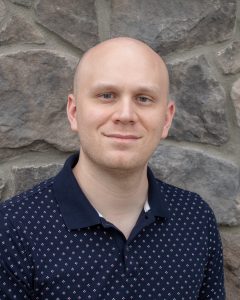
Dan Herber, assistant professor, joined the department in August 2019.
His research group’s work is broadly encapsulated by the areas of computational design, design optimization, multidisciplinary analysis, model-based systems engineering, system architecture graph theory, modeling and simulation of dynamic systems, combined physical and control system design (control co-design), and numerical methods for optimal control.
Where are you from?
I grew up in Darien, Illinois, a southwestern suburb of Chicago. My post-secondary education was spent in central Illinois, at the University of Illinois at Urbana-Champaign.
What does your current work-from-home set up look like?
Fortunately, I have a dedicated home office, which is currently receiving a lot of use. My computer setup and large monitor make it easy to work from home, and the occasional visit from my cats is always a plus.
What drew you to your research?
As an undergrad, I was very interested in graduate school but was uncertain about how graduate research was defined. I met my eventual Ph.D. advisor early in my studies through a grader appointment, and we simply started a discussion one day about potential research. He described the area of design research, optimization, and system-level design.
I immediately latched onto these ideas and this philosophy because it was exciting to be asking and answering the questions of how can we create better designs, challenge existing assumptions, and make possible what was previously unachievable using novel methods.
The combination of physics, mathematics, and computer science, along with their strong connection to the challenges in many engineering disciplines, was really attractive to me.
What is a typical day like?
Much of my core research is computational, so many of the research tasks can be performed remotely.
My day typically begins with several online meetings facilitated through all possible remote conferencing services. And I have continued, frequent interactions with my students through Slack and Zoom. In the afternoon, I try to focus more on making progress on specific research tasks, writing, and coding.
Later in the day, I typically go on a run or play a game of table tennis with my wife.
Who inspires you?
Leonhard Euler. His wide range of contributions to physics, analysis, calculus of variations, and graph theory permeate my own work, and whenever I come across another concept pioneered by Euler, I cannot help but be inspired that one person was so innovative.
What’s a fun fact about you many people may not know?
As a child, I was really interested in chemistry and earth science and thought I might be a more traditional scientist.